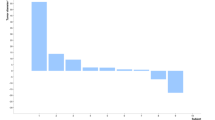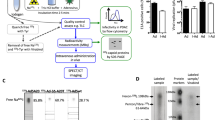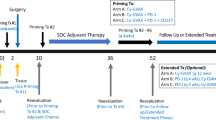Abstract
Novel therapies are needed for locally advanced pancreatic carcinoma. ONYX-015 (dl1520) is an E1B-55 kDa region-deleted adenovirus that selectively replicates in and lyses tumor cells with abnormalities in p53 function (eg gene mutation). We carried out a phase I dose escalation study of ONYX-015 in patients with unresectable pancreatic cancer. ONYX-015 was administered via CT-guided injection (n = 22 patients) or intraoperative injection (n = 1) into pancreatic primary tumors every 4 weeks until tumor progression. Interpatient dose escalation was carried out with at least three patients per dose level from 108 p.f.u. up to the 1011 p.f.u. dose level (two patients treated at this dose). The majority of patients had abnormally low cellular immunity (CD4 counts and hypersensitivity skin testing). Injection of ONYX-015 into pancreatic carcinomas was well-tolerated. Mild, transient pancreatitis was noted in only one patient. Dose-escalation proceeded to the highest dose level. Neutralizing antibodies rose post-treatment in all patients. After injection, ONYX-015 was detectable in the blood 15 min later, but not between 1 and 15 days later. Viral replication was not documented, however, in contrast to trials in other tumor types. No objective responses were demonstrated. Intratumoral injection of an E1B-55 kDa region-deleted adenovirus into primary pancreatic tumors was feasible and well-tolerated at doses up to 1011 p.f.u. (2 × 1012particles), but viral replication was not detectable.
This is a preview of subscription content, access via your institution
Access options
Subscribe to this journal
Receive 12 print issues and online access
$259.00 per year
only $21.58 per issue
Buy this article
- Purchase on Springer Link
- Instant access to full article PDF
Prices may be subject to local taxes which are calculated during checkout
Similar content being viewed by others
References
Abbruzzese J, Evans D, Rich T . Cancer of the pancreas. In: V DeVita, S Hellman, S Rosenberg (eds) Cancer: Principles and Practice of Oncology 5th edn: Lippincott-Raven: Philadelphia 1997 pp 1054–1086
Burris H et al. Improvements in survival and clinical benefit with gemcitabine as first-line therapy for patients with advanced pancreas cancer: a randomized trial J Clin Oncol 1997 15: 2403–2413
Barton CM et al. Abnormalities of the p53 tumour suppressor gene in human pancreatic cancer Br J Cancer 1991 64: 1076–1082
Pellegata N et al. K-ras and p53 mutations in pancreatic cancer: ductal and non-ductal tumors progress through different genetic lesions Cancer Res 1994 54: 1556–1562
Chang F, Syrjanen S, Syrjanen K . Implications of the p53 tumor-suppressor gene in clinical oncology J Clin Oncol 1995 13: 1009–1022
Vonlanthen S et al. Expression of p16INK4ap16alpha and p19ARF/p16beta is frequently altered in non-small cell lung cancer and correlates with p53 overexpression Oncogene 1998 17: 2779–2785
Zhang Y, Xiong Y, Yarbrough WG . ARF promotes MDM2 degradation and stabilizes p53: ARF-INK4a locus deletion impairs both the Rb and p53 tumor suppression pathways Cell 1998 92: 725–734
Leach FS et al. p53 mutation and MDM2 amplification in human soft tissue sarcomas Cancer Res 1993 53: 2231–2234
Bergh J et al. Complete sequencing of the p53 gene provides prognostic information in breast cancer patients, particularly in relation to adjuvant systemic therapy and radiotherapy Nat Med 1995 1: 1029–1034
Heise C et al. ONYX-015, an E1B gene-attenuated adenovirus, causes tumor-specific cytolysis and antitumoral efficacy that can be augmented by standard chemotherapeutic agents Nat Med 1997 3: 639–645
Bischoff JR et al. An adenovirus mutant that replicates selectively in p53-deficient human tumor cells Science 1996 274: 373–376
Heise C et al. Intravenous administration of ONYX-015, a selectively-replicating adenovirus, induces antitumoral efficacy Cancer Res 1999 59: 2623–2628
Kirn D et al. A phase II trial of intratumoral injection with an E1B-deleted adenovirus, ONYX-015, in patients with recurrent, refractory head and neck cancer Proc Am Soc Clin Oncol 1998 17: 391a
Ganly I et al. A phase I study of Onyx-015, an E1B attenuated adenovirus, administered intratumorally to patients with recurrent head and neck cancer Clin Cancer Res 2000 6: 798–806
Reid T et al. Hepatic arterial infusion of a replication-selective adenovirus. Onyx-015: a phase I/II clinical trial Proc Am Soc Clin Oncol 2000 19: 958 (Abstr.)
Khuri F et al. A controlled clinical trial of intratumoral Onyx-015, a selectively-replicating adenovirus, in combination with cisplatin and 5-fluorouracil in patients with recurrent head and neck cancer Nat Med 2000 6: 879–885
Ganly I et al. A phase I clinical trial with ONYX-015 (a selectively replicating adenovirus) administered by intratumoral injection in patients with recurrent head and neck cancer Clin Cancer Res 2000 6: 798–806
Engelhardt JF, Ye X, Doranz B, Wilson JM . Ablation of E2A in recombinant adenoviruses improves transgene persistence and decreases inflammatory response in mouse liver Proc Natl Acad Sci USA 1994 91: 6196–6200
Gooding LR . Regulation of TNF-mediated cell death and inflammation by human adenoviruses Infect Agents Dis 1994 3: 106–115
Yang Y et al. Inactivation of E2a in recombinant adenoviruses improves the prospect for gene therapy in cystic fibrosis Nat Genet 1994 7: 362–369
Ginsberg HS et al. A mouse model for investigating the molecular pathogenesis of adenovirus pneumonia Proc Natl Acad Sci USA 1991 88: 1651–1655
Ginsberg HS, Horswood RL, Chanock RM, Prince GA . Role of early genes in pathogenesis of adenovirus pneumonia (published erratum appears in Proc Natl Acad Sci USA 1991; 88: 681) Proc Natl Acad Sci USA 1990 87: 6191–6195
Ginsberg HS et al. Role of early region 3 (E3) in pathogeneis of adenovirus disease Proc Natl Acad Sci USA 1989 86: 3823–3827
Heise C, Williams A, Olesch J, Kirn D . Efficacy of a replication-competent adenovirus (ONYX-015) following intratumoral injection: intratumoral spread and distribution effects Cancer Gene Therapy 1999 6: 499–503
Hecht JR et al. A phase I study of multiple direct injections of ONYX-015 adenovirus under endoscopic ultrasound guidance Proc Am Soc Clin Oncol 1999 18: 186 (Abstr.)
Kirn D . Replication-selective micro-organisms: fighting cancer with targeted germ warfare J Clin Invest 2000 105: 836–838
Barker DD, Berk AJ . Adenovirus proteins from both E1B reading frames are required for transformation of rodent cells by viral infection and DNA transfection Virology 1987 156: 107–121
Acknowledgements
We would like to acknowledge the assistance of the following individuals: Margaret Uprichard, Sherry Toney, Olga Diri, Britta Randlev, Brian Breitbard, Dianne Davies, Chris Maack, Larry Romel, Amy Waterhouse, Fran Kahane, Patrick Trown. This study was sponsored by Onyx Pharmaceuticals, Richmond, California.
Author information
Authors and Affiliations
Rights and permissions
About this article
Cite this article
Mulvihill, S., Warren, R., Venook, A. et al. Safety and feasibility of injection with an E1B-55 kDa gene-deleted, replication-selective adenovirus (ONYX-015) into primary carcinomas of the pancreas: a phase I trial. Gene Ther 8, 308–315 (2001). https://doi.org/10.1038/sj.gt.3301398
Received:
Accepted:
Published:
Issue Date:
DOI: https://doi.org/10.1038/sj.gt.3301398
Keywords
This article is cited by
-
Oncolytic adenoviruses and the treatment of pancreatic cancer: a review of clinical trials
Journal of Cancer Research and Clinical Oncology (2023)
-
Immunotherapy for pancreatic cancer: chasing the light at the end of the tunnel
Cellular Oncology (2021)
-
Re-designing Interleukin-12 to enhance its safety and potential as an anti-tumor immunotherapeutic agent
Nature Communications (2017)



